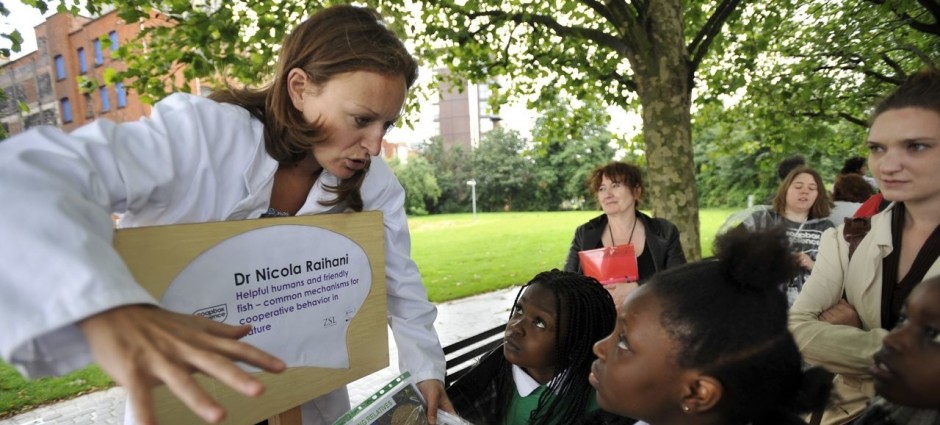 Dr Lynsey Gozna (@dranzog), University of Leicester / University of Nottingham, is taking part in Soapbox Science Bristol on Saturday July 15th 2017 where she will give a talk called: “The fantasy and reality of revenge”
Dr Lynsey Gozna (@dranzog), University of Leicester / University of Nottingham, is taking part in Soapbox Science Bristol on Saturday July 15th 2017 where she will give a talk called: “The fantasy and reality of revenge”
SS: How did you get to your current position?
LG: I have been working in academia for over a decade teaching forensic psychology and conducting research in the area of serious offending and risk assessment including revenge, child sexual exploitation, stalking and arson. I moved into academia on the completion of my PhD in the detection of deception and completed this along with my previous employment as a psychologist working on defence and security research programmes, mainly for the Ministry of Defence. My research has always involved collaboration with external organisations (e.g. police forces, fire service, probation, prisons and forensic mental health) because I think it is critical in this field to conduct research that has real world impact – that means it is generally not helpful to have undergraduate students as our samples.
SS: What, or who, inspired you to get a career in science?
LG: I have always had an interest in investigating mysteries – it started with my childhood focus on Enid Blyton’s Famous Five and ‘The Hardy Boys’ and ‘Nancy Drew’ – this moved to Agatha Christie’s Poirot and Marple and Sir Arthur Conan Doyle’s Sherlock. Once I was studying Psychology, it was the forensic area that most interested me to learn about what motivates people to commit crime and how to reduce offending and understand and support victims. Most recently my considerations of practice work have been influenced by psychoanalytic approaches to understanding behaviour such as Sigmund Freud and Erich Fromm.
SS: What is the most fascinating aspect of your research/work?
LG: My research is mainly qualitative in approach because in applied forensic psychology it is critical to understand fully the realities of the offending people commit and to understand in particular personality, motive and mindset. Therefore being involved in interview research where you can hear the experiences of individuals who have experienced a range of adversity but who have also committed offences themselves allows you to gain insights into their motive and how they see the world. This undoubtedly informs my practice work and teaching because I am able to draw from real world narratives. Reducing people down to a set of numbers simply doesn’t allow me to explore the issues I am interested in.
SS: What attracted you to Soapbox Science in the first place?
LG: The opportunity to talk about my research and take this to the public domain is really important to me, particularly with fellow female scientists who are all passionate about their research. There can be misconceptions about offending behaviour, perhaps because many people do not routinely work with this client group. Most recently I have been exploring revenge motivated offending and this has highlighted the experiences of male offenders who have been victims themselves and who have struggled to come to terms with the aftermath of abuse, neglect, violence and the corresponding damage. To be able to explore these issues sensitively with the public in terms of how childhood adversity can lead to offending and in particular the victimization of boys and young men is critical to helping society protect the vulnerable.
SS: Sum up in one word your expectations for the day
LG: Memorable
SS: If you could change one thing about the scientific culture right now, what would it be?
LG: The greatest struggle I experience is the little value that is often placed on real world research – that is, research conducted outside of the laboratory. There is a traditional view that statistics and laboratory experiments produce the best scientific outcomes and when you work in the world of forensic psychology, you know that this is not the case. However this is a broader problem, people need to be more innovative in their approaches to research, think differently, be risk takers and not conduct research for the sake of it or purely to publish due to the pressures on academics. We run the risk of valuing research that is constantly reinventing the wheel and not breaking new ground. That is what I would like to change.
SS: What would be your top recommendation to a woman studying for a PhD and considering pursuing a career in academia?
LG: I think it is important to pursue a scientific field that inspires you so that you have the opportunity to thrive in your career and to inspire others, especially those coming into the area. The advice I would give to anyone would be that you have to make your own opportunities and don’t wait for others to create them for you. Do something that makes a difference and will truly have an impact.
